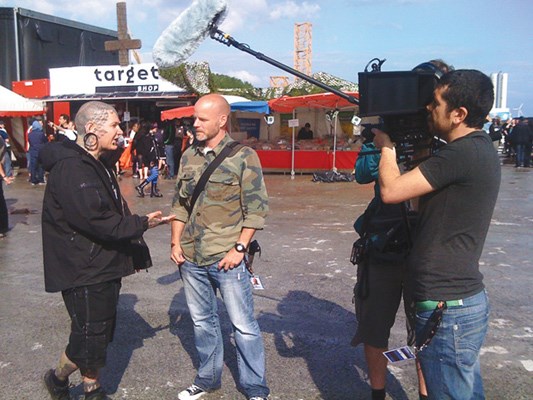- Argo. Directed by Ben Affleck. Starring Affleck, Alan Arkin and John Goodman.
Rating: 8 (out of 10)
Argo, Ben Affleck's film about the escape of six U.S. embassy personnel during the 1979 Iran hostage crisis, is cannily relevant. The film premiered at Toronto the same week as Canada shut its embassy doors in Iran, citing recent attacks on foreign diplomats in Iran.
Canada enjoyed full credit for the liberation of the six Americans, who escaped and were harboured by ambassador Ken Taylor in his Canadian embassy residence. Documents declassified in 1997 brought to light the fact that Taylor was working closely with the CIA, and an exfiltration operative named Tony Mendez, who disguised the six as members of a film crew, provided a credible backstory for a fake sci-fi film, and shepherded them out of Iran. (Fifty-two other Americans languished, held captive at the embassy for a total of 444 days.)
Affleck's film opens with a much-needed history primer, and newsreel footage blended with granular Super 8 photography to delineate the events leading up to the hostage crisis. Tension is ramped up immediately: the atmosphere inside the U.S. embassy thickens in the chaos of shredding, burning sensitive documents, and hostage-taking as an angry crowd is whipped into a frenzy outside.
After six employees find a way out and seek refuge with the Canadian ambassador (Victor Garber) the CIA calls in Mendez (Affleck) to pitch ideas about how to get the six out undetected, lest they compromise the safety of the 52 left behind. Journalists? Too risky for the real newsmen in Iran. Bicycles across the border? It's winter, Mendez points out.
Turns out the idea is borne of Planet of the Apes. Mendez turns to his contact in the film industry, makeup artist John Chambers (John Goodman), to provide a credible backstory for the six as a film crew scouting locations in Iran. A known producer (Alan Arkin) is brought on board; there's a press launch at the Beverly Hilton to sell the lie. Argo is the phony film that will never be greenlit. "You don't have a better bad idea than this?" asks Ambassador Turner. "This is the best bad idea we have, sir," says Mendez.
Mendez gets approval from his boss (Bryan Cranston): "Don't f*** up: the whole country is watching you, they just don't know it."
Leaving the familiarity of Boston for his previous directing efforts (Gone Baby Gone and The Town), Affleck chooses Istanbul to stand in for Tehran, with women in chadors eating KFC and bodies hanging from construction cranes. Sense of period is precise, from autos to those shaggy haircuts.
Hostages (Tate Donovan, Scoot McNairy, Kerry Bishe, Christopher Denham, Clea DuVall, Rory Cochrane) present real fear and urgency while Goodman and Arkin add levity, without tipping the balance. ("John Wayne's in the ground six months, this is what's left of America," says Arkin's Les.) A too-staid Affleck holds it all together, but would it kill him to let his character do a little victory dance, or something?
Adapted from Mendez's book Master of Disguise and a Wired magazine article by Joshuah Bearman, Argo succeeds because of strong narrative and great sustained tension, even though we know how it ends. Filmmakers pull out every stop, every improbable delay, from stuck gears to locked doors to chases on the tarmac. But, improbably, it works.
If the film downplays Canada's risk and involvement in the rescue, Affleck provides a sort of mea culpa in the credits, noting that the CIA "complemented" Canada's effort to free the six held in Tehran, and that "To this day the story stands as an enduring model of international cooperation between governments."
Also stay seated to check out photographs of the real players at the end to see how well-matched the actors are, and to hear Jimmy Carter's take on things (before Ronald Reagan swooped in to take credit).
- Hellbound? Written and directed by Kevin Miller.
Hellbound?, the new documentary from Abbotsford filmmaker Kevin Miller, opens on a controversial note: it's the 10th anniversary of the Sept. 11 attacks in New York City, and a small but noisy group is chanting and waving signs reading "Thank God 4 9-11."
This is why we want hell, Miller posits: "In the face of such overwhelming evil, sometimes our only comfort is the hope that somehow the people who do such things will have hell to pay." (Whether you feel that "overwhelming evil" lands at the feet of those men who flew the planes into the World Trade Center and Pentagon, or upon the people waving the signs a decade later, is also at issue.)
So begins a theological, political, emotionally fraught journey to decide who's right: the people who believe in eternal damnation (hell, but only for some); annihilationists (those not saved will be destroyed outright); or universalists (everyone can be redeemed regardless of the kind of life they lived on earth).
Miller consults with pastors, exorcists, scholars, death metal artists, authors and theologians in his quest to understand whether fire and brimstone can really be God's final answer. Does God play favourites? An answer one way or the other ultimately lessons his omnipotence, or defies the "God is Love" doctrine. And politically, a discussion of heaven and hell and who gets in won't always land favourably with the side you are on, points out one theologian: "there are no good guys and bad guys - we're all in the same fix."
Miller presents a provocative, ultimately hopeful documentary sure to pique the interest of atheists and religious alike.



